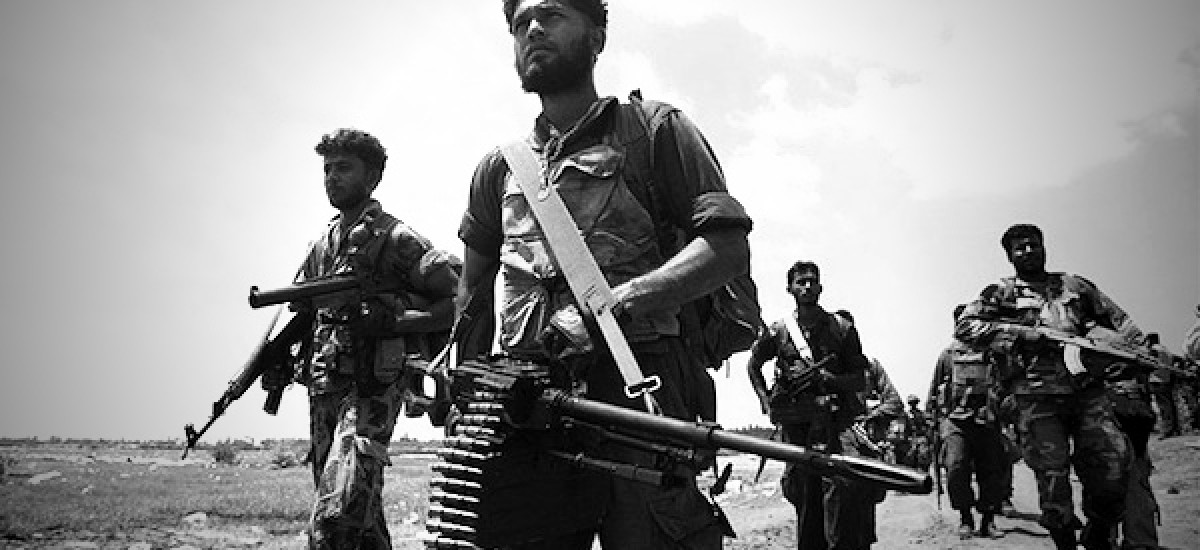Original image from AFP | The Sydney Morning Herald
The Sri Lanka defense establishment is organizing a counter-insurgency seminar from the 31st of May to 2nd of June 2011. It has invited over 50 countries for the seminar with a stated objective of sharing the Sri Lankan experience of successful counter insurgency operation against the LTTE. At the same time there is a strong group of human rights activists who are advising against participation in this seminar and calling for a boycott. I beg to differ for a number of reasons, not least because boycotts and sanctions are probably the bluntest instruments.
Firstly, it gives an opportunity for the military personnel form different countries to get an account of the various strategies and tactics used. While we may not agree with some of the strategies and tactics it is very likely that there were innovations – the LRRPs, planned recruitment and resource mobilization, effective use of para-military, the organizing and deployment of fighting units, carefully cultivated political support etc. In a global context where the non-state actors including the terrorists have an active learning and sharing network it is imperative that the military too have such opportunities – to keep abreast of best practice and bad practice.
Secondly, it is naive to assume that the armed forces of the world are going to uncritically accept the Sri Lankan experience of counter insurgency. None of them, if they can help it, will want to be accused of war crimes and have a UN panel report on their conduct. It is very likely that they will be asking much more informed questions about military objective and strategies, nature of the operational threat faced, nature of weapons used, proportionality, measures taken to obtain intelligence about targets, to minimize civilian casualties and the decision making command and control structures. Irrespective of what the Sri Lankan military say, the participants with deep knowledge in warfare will be able to piece together what happened much more clearly than most of the human rights activists.
So if the human rights lobbyists are influential enough (which I doubt they are) rather than call for a boycott they should try and influence the participants to engage more ‘fully’ in understanding the counter insurgency experience of Sri Lanka.
The participants should be encouraged,
- to ask for a field visit to the stretch of land where the final phase of the war took place and a briefing on the number and movement of civilian population through the final days
- to ask for a half a day session to meet groups with alternative view points. Clearly the cost of the Sri Lankan experience in the counter-insurgency is equally important to be understood and there are civil society groups who will be able to give the other side of the Sri Lankan experience.
- to ask for a visit to the Menic farm area and for a discussion with key humanitarian agencies
Even if the organizers are unable to accommodate the above, the participating military personnel should be encouraged stay a day or two extra and to do the above. Again the respective embassies and high-commissions can be asked to facilitate such discussions so that their military representatives will be able to get a fuller understanding.
The official seminar web-site www.defseminar.lk no longer carries the list of countries whose military have confirmed participation. Now it only contains the list of countries that have been invited. Once the participants are confirmed, it might also be a good idea to compile some reading material on the conduct of the war – including the UN Panel report, local paper articles, UNHRC resolution, reports by human rights organizations and UN special representatives, press statements by UN, ICRC and humanitarian agencies etc. These might help the participants to raise and clarify various issues – including the use of paramilitary that included child soldiers among them as a counter insurgency strategy, use of white vans and extra-judicial killings, shutting off media from the theatre of war and silencing of the media, the rationale for the ‘illegal’ internment of 270,000 tamil civilians, the restrictions on humanitarian space, non-recognition of the role of ICRC in visiting detainees and family-reunification etc. A dialogue between the Sri Lankan military and military personnel from other countries on these issues surely will be more illuminating than the discussions in parallel worlds currently going on between those from the legal/human rights school and the military.
I would love to attend this conference. One of the stated objectives of the seminar is ‘a better understanding and sharing of knowledge in Political reforms to accommodate all ethnic communities and nation building’. I want to know what these ‘political reforms that accommodate all ethnic communities’ are. Don’t you? Why is it that only foreign military personnel are privileged to hear that!


